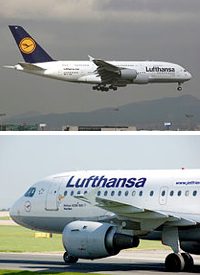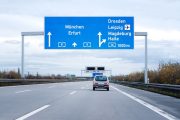
German airline carrier Lufthansa warned passengers on Monday that the European Union’s (EU) new carbon tax on airlines will translate into higher fares, as the carrier plans to avoid shouldering new costs generated from an EU carbon trading scheme. Analysts say Lufthansa is among the airlines most influenced by the measure, along with rival carriers British Airways, United Continental (the two have merged), Air France, and Singapore Airlines.
Beginning January 1, 2012, the Emissions Trading Scheme (ETS) requires airlines to hold emission rights in the form of CO2 certificates for all flights traveling in and out of Europe. Under a directive intended to tackle alleged climate change, airlines flying in and out of the 27-nation European Union and three neighboring countries will be subjected to CO2 regulations as part of an expansion of the world’s largest carbon market. Any emissions beyond selected allowances must be paid for, while airlines are allowed to trade permits among themselves.
India, China, and a handful of other nations including the United States have protested the measure, as the Obama administration, the aviation industry, and various free market groups have expressed firm discontent. A legal challenge against the ETS, triggered by a handful of U.S. airlines, failed in December when the European Court of Justice shot it down. Some opposing countries have taken actions to combat the initiative:
- The U.S. House of Representatives last October passed a resolution prohibiting U.S. carriers from participating in any ETS unilaterally set up by the E.U., declaring that the E.U. action “directly infringes on the sovereignty of the United States.”
- India’s aviation ministry has threatened to levy a retaliatory tax on European airlines operating to and from India, and at one point even considered the possibility of revoking landing rights for E.U. carriers altogether.
- The Chinese government warned it may impose punitive tariffs; China’s four major airlines and the China Air Transport Association (CATA) plan a joint lawsuit against the E.U.; and CATA — which estimates the ETS will cost Chinese airlines about $124 million a year each — has suggested that Beijing should threaten to reduce future purchases of E.U.-made Airbus aircraft.
- Russia has threatened to hike overflight charges for European airlines flying to and from Asian destinations.
Opponents of the EU directive have argued that the ETS violates national sovereignty, usurps international law, and severely limits attempts to find a global solution through the International Civil Aviation Organization (ICAO), a specialized agency of the United Nations which promotes “the safe and orderly development of international civil aviation throughout the world.”
However, environmental groups claim the ICAO has long delayed an effective solution, which was first called for under the 1997 Kyoto Protocol. The EU’s Executive Commission stated that aviation is responsible for three percent of total greenhouse gas emissions blamed for alleged global warming.
Germany’s largest airline indicated that it would add the costs from the trading scheme — approximately $169 million — to its existing fuel surcharge, being the first company to announce its plans in dealing with the additional costs. “In the face of intensive competition, especially of companies from non-EU countries whose production is subject to emissions trading to only a small degree, Lufthansa will have to pass on the burden via ticket prices, as suggested by the EU,” the company disclosed in a statement.
Carsten Spohr, an executive board member of Deutsche Lufthansa AG, added:
Climate change is a global challenge. This means we also need a global solution. The incorporation of airlines in the EU Emissions Trading Scheme means that European operators are now facing additional costs which will make flying within and via Europe more expensive for passengers. It will also distort competition and impact on the sustainability of the aviation industry if it proves impossible to implement with the competitive neutrality promised by policy makers. However, given the huge resistance at international level, it is unclear just how the situation will develop.
The International Air Transport Association (IATA) — which represents more than 200 airlines, accounting for 93 percent of international air traffic — disputed the ETS and contributed to the legal challenge exerted last month. Overall, the IATA projected that the ETS will cost the airline industry $1.16 billion this year, and up to $3.63 billion in 2020.
But passing along the costs to consumers alone is not a viable solution, noted a 2007 study published and financed by aviation companies and organizations including Airbus, Boeing, IATA, and the Association of European Airlines. According to the analysis, the ETS will cost airlines more than $60 billion between 2011 and 2022, and these carriers will be forced to absorb a considerable portion of the added expenses.
Airlines have previously bemoaned the peremptory burdens of high taxes, surging fuel prices, and turbulent competition; these additional expenses will only compound the financial obstacles for an industry already suffering from steadily worsening economic conditions.
Analysts note that the crunch point will not arrive until March 2013, when carriers will have to surrender enough permits to cover this year’s carbon emissions. In addition to stiff fines, which are substantially higher than the amount they pay for complying with the ETS, carriers could also be barred from European airspace if they do not adhere to EU standards.
Under the program, in 2012 airlines will collectively be granted free permits amounting to 85 percent of their estimated needs. However, the industry says the plan’s allocations are too meager because travel has increased since the figures (based on 2004-06 data) were formulated for the directive.
Because of increased travel, and the anticipation of future expansion, Lufthansa predicts that it will have to buy at least 35 percent of the certificates it needs to represent its growth in recent years. And what many EU officials and environmental groups neglect to note is that these politically-manufactured costs will inevitably be passed on to the consumer.



